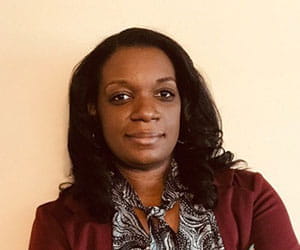
Adrian Green’s first encounter with social work was when she was a teenager. “My two cousins were in kinship with my paternal grandmother, and I saw the social worker come by and speak to them to make sure their needs were being met. She was genuinely interested in how they were doing and understanding what they wanted to happen,” recalls the PhD in Social Work student and 2018 recipient of a Barbara Solomon Scholarship for Social Work.
Green interned with child protective services while she was earning her bachelor’s degree in social work, and the rest is history. “I got the real first taste of what social workers do, and it grabbed me and kept hold of me all of these years,” she says of her more than 10 years at the Mecklenburg County (North Carolina) agency. Green started out as an in-home social worker and then did short-term investigative work for the agency. “It was everything I thought it would be. I really enjoy building relationships with the children and families and seeing the change that can come.”
Now, as the supervisor of a team of investigators and in-home workers at the same agency, Green is hoping for an opportunity to really make a difference. “I decided to earn my PhD in Social Work because I want to make an impact at all levels—agency, community, county, and state,” she says. “With my advanced degree from Walden, I’ll have the skill set to be a change agent within the agency and beyond, because I’ll not only feel confident and comfortable, but others will trust my recommendations for improving child welfare because it will be supported by research.”
Green sees two issues of concern within child protective services. The first involves the children. “There are more cases called in and accepted involving African-American children than any other race. This means more African-American children and their families are investigated, substantiated, and found in need of services than any other race. More African-American children are removed from their homes than any other race, and more African-American parents lose their rights to their children than any other race,” she explains. “And yet there is a disproportionality of African-American families to foster the high rate of African-American children within child protective services.”
Foster care affects a child for the rest of his or her life. Social workers are charged with finding kids permanent homes, whether that’s reunification, guardianship, or adoption. “As social workers, we’re making a decision between placing an African-American child with a family of a different ethnic background in their community or placing them well outside their geographical periphery in order to maintain a cultural tie. Our focus is always to keep the family together and do everything possible to keep the child at home, but in the event we have to remove a child from his or her home, we want to make sure we’re making the right decision on behalf of that child’s welfare,” Green says. “We have the chance to be a positive change or negatively impact children with each and every step we take to try and keep them safe. Just one day in foster care has long-term impact.”
A special team at the agency is taking a closer look at disproportionality, and Green is hopeful it will make a positive impact, but she is using her doctoral study to focus on her other area of concern: how to retain social workers. “Change starts with social workers, and the turnover consistently remains high,” Green explains. “I want to know what we can do to change that and make sure we retain these hardworking and caring individuals.”
—Jen Raider



